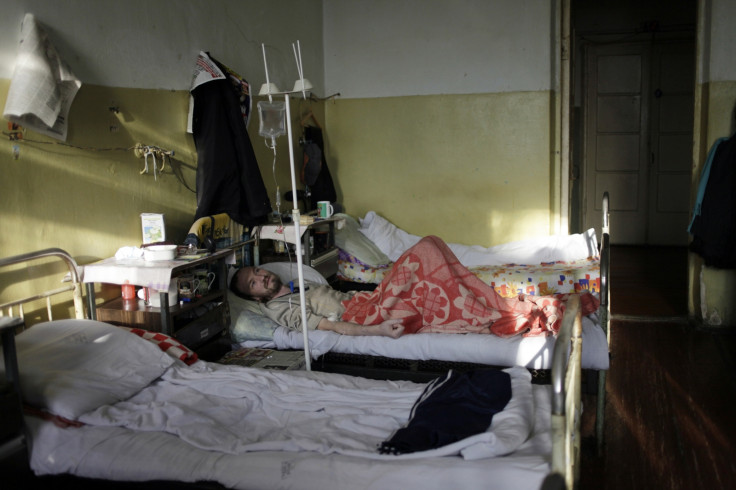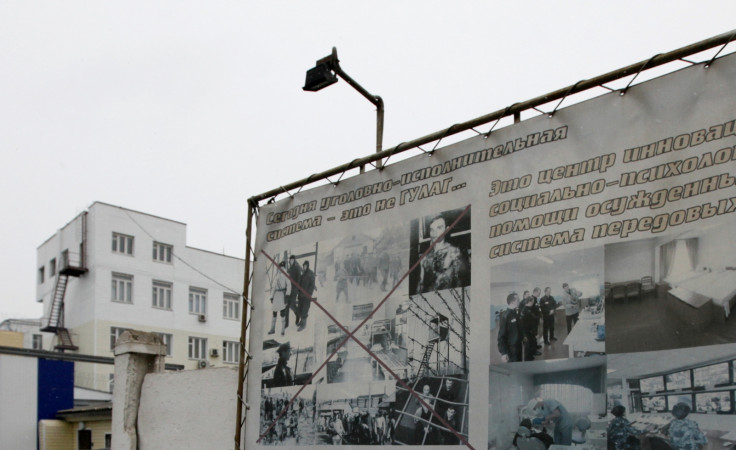Why are rates of drug-resistant TB so high in Russia?

Natalya, 31, from Saint Petersburg, is being treated for a new and virulent form of an ancient disease ravaging Russia.
"I find it difficult to judge whether the treatment of tuberculosis in Russia is good or bad because I am just one person," she says. "But there is not enough equipment to determine drug-resistant tuberculosis. I was treated for six months for ordinary tuberculosis before the doctors realised I had it."
"People with tuberculosis have been forgotten by the Russian authorities," Natalya tells IBTimes UK. "I was lucky, I got sick in Saint Petersburg and was treated in relatively well. But I have friends living elsewhere in Russia, who were told that their hospitals do not have the necessary medicines to be treated."
Tuberculosis is the leading infectious killer in Russia. The problem in the region, one of the "high priority countries" highlighted in a recent World Health Organization report, is being fuelled by multi-drug resistant tuberculosis (MDR-TB). While the number of overall tuberculosis cases has slowly declined over the last decade, rates of drug-resistant strains remain very high – and continue to climb. It is expensive and difficult to treat, and deadly.
Inadequate healthcare
Tuberculosis exploded in Russia in the mid-1990s in the midst of the socioeconomic crisis that followed the collapse of the Soviet Union. As the country's healthcare infrastructure crumbled, poverty, crime and alcoholism soared, as too did tuberculosis. The disease spread quickly through overcrowded penal institutions, where rates are still reported to be up to 100 times higher than within the civilian population.
NGOs and organisations working to tackle tuberculosis in Russia have consistently pointed out that outdated approaches to treatment are abetting the spread of the disease, rather than curbing it. Long-stay facilities for patients, a cornerstone of the Soviet healthcare system abandoned long ago by the West because it contributed to transmission, remain.
Drug resistance arises due to the improper use of antibiotics in the treatment of tuberculosis. Dr Lucica Ditiu, executive secretary of the Stop TB Partnership, explains that the inadequate management of treatment is a major contributing factor to the epidemic.
"When drug-resistant tuberculosis started appearing it was not a spontaneous mutation of the microbacterium, it was spread by bad management of treatment: either the treatment was incomplete, the drugs were not quality-assured or the patient was not fully supported throughout the treatment," she says. "Treating MDR-TB is very difficult. It is costly and there are many side effects, so you really need a good system in place for people to finish the treatment."

Yet the system in place is biased towards the affluent – and against the groups most susceptible to tuberculosis. A postcode lottery dictates the quality of care outside of Moscow and Saint Petersburg, where there seems to be little support for patients. Maria, 24, is being treated for tuberculosis in her hometown of Novomoskovsk, an industrial city in the Tula Oblast.
"The treatment of TB depends on where you live and it is not adequate in my area," she says. "Not all hospitals have the facilities to treat you, and patients cannot always afford to buy their own medicines."
Healthcare systems are in place for some, but not all. Drug users, sex workers, ex-prisoners, illegal immigrants and the poor – Russia's most vulnerable and the highly susceptible to the disease – have limited access to healthcare. A significant factor in this is the criminalisation of drug users in Russia, which takes a hard-line approach to drug use, implementing repressive legislation and lengthy prison terms for the possession of even tiny amounts of hard drugs.
"The difficulty in Russia is that many drug users are criminalised, so unless this changes, people who may be sick and need medical assistance will be too scared to come forward," says Ditiu. "The Russian government is not keen to reach out to drug users or sex workers, among which drug-resistant tuberculosis is spreading."
Funding cuts
Yet in the midst of this desperate situation, the Russian government has made decisions that have astounded international observers. In 2012, the Kremlin rejected money from the Global Fund for Aids, TB and Malaria, justifying the move by claiming the country is now a donor to the Global Fund and that it would be wrong for it to continue to take money from the organisation.
Many have viewed the move as entirely political – as part of an attempt by the Kremlin to crack down on foreign NGOs operating in Russia. One of the biggest funders of TB programmes, USAID, was banished by Russian authorities in the same year because it is American, forcing dozens of TB projects to close their doors. It was forced to stop operating on the grounds that it was interfering in Russian politics.
The money Russia has put into tackling TB is high, but nobody knows exactly what the money is being spent on – and if it is reaching the right people. "I think a lot of the money going into hospital care and other intervention are not the most cost-efficient," Ditiu says.
"What was lost when Russia cut funding from the Global Fund, I think, is the opportunity to work with vulnerable groups. Without outside funding, it is just Russia leading efforts against tuberculosis," she adds.
"It is a good thing when the country is considered wealthy and healthy enough to put their own money into interventions. But the question is – what interventions? We don't know where the money is being invested."

Co-infection with HIV
Russia is home to another global crisis: it has one of the fastest-growing HIV and Aids epidemics in the world. A decade ago, 170,000 people in the Russian Federation had HIV, but the number now is 1.2 million – with the majority of cases spread by drug use or prostitution. Co-infection with HIV and TB is now a major problem.
There are a number of reasons for the high HIV rates, from inadequate healthcare to stigma and policies that discriminate against those at risk of infection. For one, essential HIV-prevention services are largely inaccessible.
Opioid Replacement Therapy, used successfully elsewhere to wean drug users onto longer-acting opioids such as methadone or buprenorphine, is banned under Russian federal law on narcotic and psychotropic substances. Very few Russians have access to clean needle programmes. And most significantly, the groups in which HIV and TB are transmitted are intertwined in Russia – which has led to the two diseases fuelling one another.
"Any weakness of the immune system caused by HIV makes you susceptible to TB," says Ditiu. "The two diseases go hand in hand. You need to have an intersection of groups with HIV and TB, which I have seen in prisoners and drug users. Overcrowding in prisons can create an incubator for the disease."
Poor sanitary conditions, inadequate nutrition and overcrowding have contributed to high rates of drug-resistant tuberculosis in Russian prisons. According to the Russian Federal Penitentiary Service, one in seven prisoners have an active form of the disease.
Stigma and support
Patients with tuberculosis need 24/7 support that they simply do not have. The side effects of treatment for MDR-TB, in particular, can be extensive and debilitating: nausea, sickness, diarrhoea, deafness, confusion and problems with the nervous system – including lost feeling in limbs – are all common. In all former Soviet countries, patients receive limited support, despite suffering serious social and economic strain during this difficult time.
Ivan, 32, is from the city of Gomel in south-eastern Belarus. He is in the final stages of extensively drug-resistant tuberculosis (XDR-TB).
"I was treated for 14 years and now I have end-stage XDR-TB," Ivan says, speaking under a false name. "My drugs and treatment have been stopped and I am waiting for death. There is a lack of adequate treatment in Belarus and if you are tested with drug-resistant tuberculosis, your treatment can be stopped and you are sent home or to a hospice to die."
"I do feel like I have been forgotten by my country, but I am also indifferent because there is nothing I can do," he says.
The lack of support boils down to one key factor: tuberculosis remains highly stigmatised around the world. In Russia and its neighbouring countries, people associate the disease will painful memories of the social and economic turmoil of the 1990s – tuberculosis is seen as the disease of drug addicts, sex workers and criminals. Stigma makes epidemics worse, stymieing any progress against the disease and preventing people from walking into a tuberculosis clinic. It also prevents patients from completing their course of medication, which, in turn, spreads drug-resistant tuberculosis.
"A big problem is the stigmatisation of patients. People in Russia think it is just drug addicts and prisoners who get the disease and they only think of themselves – they fear it and so they feel they cannot talk about it," says Ksenia Shchenina, a journalist and prominent Moscow-based tuberculosis activist.
During treatment for tuberculosis a few years ago, Shchenina met a women who refused to tell her husband about her condition, fearing it would "drive him away from home". "This perception of tuberculosis needs to change to help tackle the disease," she says. "There are few activists who will talk about their experience."
Names may have been changed in this article.
© Copyright IBTimes 2024. All rights reserved.






